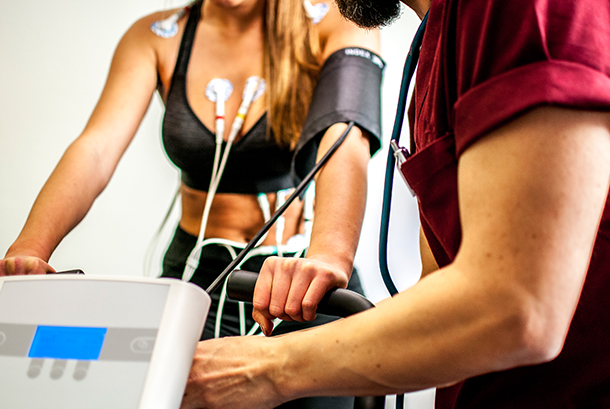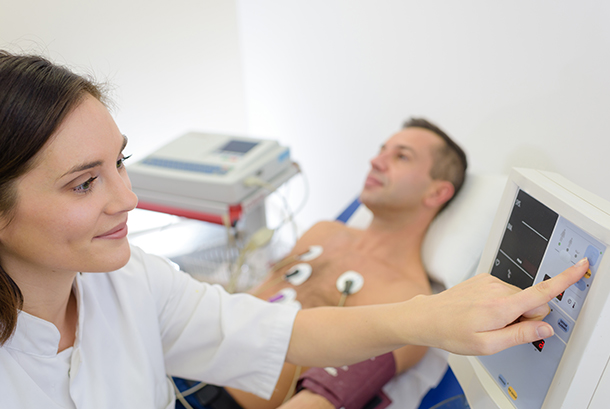At Asclepius Medical Clinic, we perform all cardiac tests including ECG, Exercise Stress Test, Echocardiogram and Holter monitoring. These tests may be recommended if you have the following symptoms:
- Palpitations
- Chest pain
- Shortness of breath
- Dizziness


ECG
What is an ECG?
An electrocardiogram (ECG or EKG) is a test that checks how your heart is functioning by measuring the electrical activity of the heart. With each heartbeat, an electrical impulse (or wave) travels through your heart. This wave causes the muscle to squeeze and pump blood from the heart.
An ECG measures and records the electrical activity that passes through the heart. A doctor can determine if this electrical activity is normal or irregular.
An ECG may be recommended if you are experiencing arrhythmia, chest pain, or palpitations. An abnormal ECG result can be a warning sign for several different heart conditions.
How long does it take?
10-15 minutes
How to prepare:
No special preparations are necessary.
Holter Monitoring
What is Holter Monitoring?
Holter monitoring is usually used to diagnose heart rhythm disturbances, specifically to find the cause of palpitations or dizziness.
You wear a small recording device, called a Holter monitor, which is connected to small metal disks (called electrodes) that are placed on your chest to get a reading of your heart rate and rhythm over a 24-hour period or longer. Your heart’s rhythm is transmitted and recorded on a tape, then played back into a computer so it can be analyzed to find out what is causing your arrhythmia. Some monitors let you push a record button to capture a rhythm as soon as you feel any symptoms.
Why is it done?
To determine how the heart responds to normal activity. It may also be used after a heart attack, to diagnose heart rhythm problems and when starting a new heart medicine.
How long does it take?
24, 48 or 72 hours
How to prepare:
You should bathe before your appointment because once your monitoring begins you cannot get the monitor wet or remove it to bathe. A technician will place electrodes that sense your heartbeat on your chest. For men, a small amount of hair may be shaved to make sure the electrodes stick. Once your monitor is fitted and you’ve received instructions on how to wear it, you can leave your doctor’s office and resume your normal activities.


Stress Test
What is a stress test?
An exercise electrocardiogram (ECG) records your heart’s response to the stress of exercise. An exercise ECG measures your heart’s electrical activity, blood pressure and heart rate while you exercise, usually by walking on a treadmill.
Why is it done?
- A stress test is usually done to pinpoint the cause of unexplained chest pain, especially in coronary artery disease (heart disease) is suspected.
- If you have been diagnosed with coronary artery disease, you may be given an exercise ECG to determine how far the disease has progressed and how much exercise you can do safely.
- If you have had a heart attack or heart surgery, it can help determine how much work or exercise you can do safely.
- It may also be recommended if you are experiencing irregular heartbeats, very fast or slow heartbeats, palpitations (unusual throbbing or fluttering sensations in the heart), dizziness or excessive fatigue.
How to prepare
- Wear clothing and shoes that are comfortable for exercising.
- You’ll probably be told not to eat for at least two hours before the test.
- If you’re a smoker, you’ll also need not to smoke for at least two hours before the test.
- Talk to your doctor about any medications you are taking.
How long does it take?
20 to 30 minutes
Cardiac Ultrasound / Echocardiography
What is Echocardiography?
An echocardiogram (ECHO) uses sound waves (ultrasound) to create a picture of your heart. The recorded waves show the shape, texture and movement of your heart valves, as well as the size of your heart chambers and how well they are working. An ECHO may be done to assess a variety of heart conditions, such as heart murmurs, damage to heart muscle in those who have had a heart attack, and infections in the heart. It may also be recommended if you are experiencing abnormal heart sounds, shortness of breath, palpitations, angina (chest pain) or have a history of stroke.
What to expect
A gel is placed on your chest to help transmit the sound waves and a transducer (a unit that directs sound waves) is moved over your chest. This test involves no pain or discomfort.
How to prepare
For a regular echocardiogram, no special preparation is needed.
How long does it take?
15 to 30 minutes
Reference: https://www.heartandstroke.ca/


